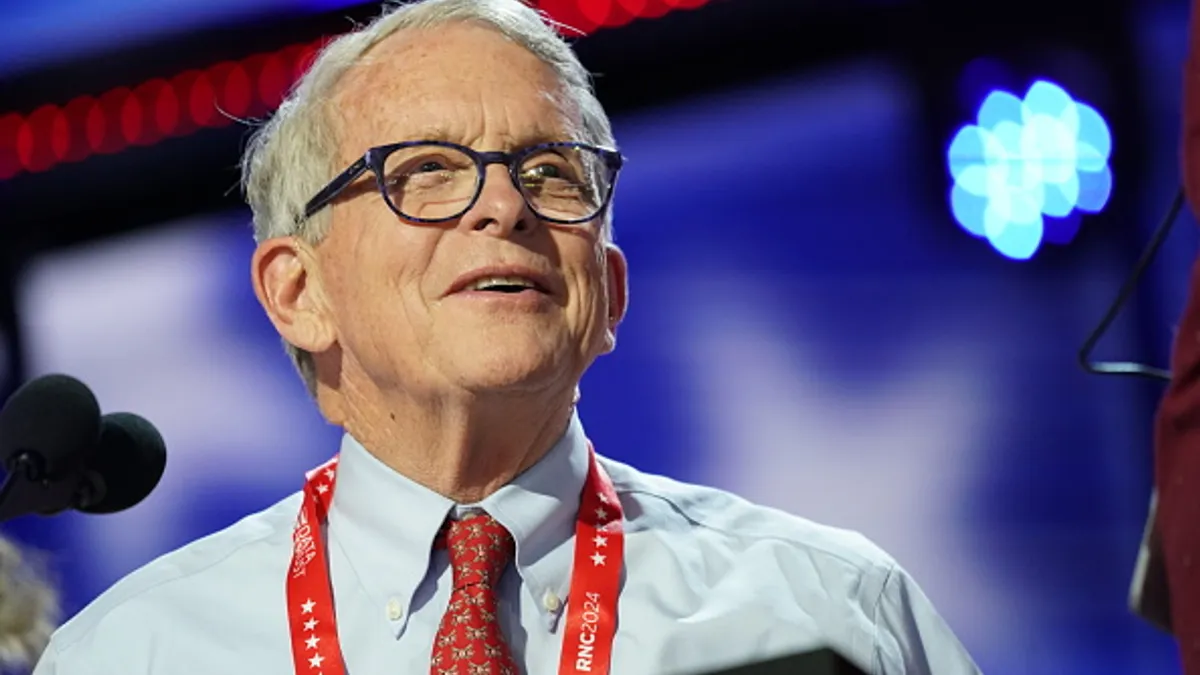Dive Brief:
- Ohio Gov. Mike DeWine signed a broad range of regulatory reforms into law Wednesday, including House Bill 238, which eliminates the requirement for accountants to obtain 150 college credit hours in order to become licensed certified public accountants in the state and provides alternative paths to licensure, according to The Ohio Society of CPAs.
- Beginning Jan. 1 of next year, the state will offer two revamped routes to CPA licensure: One requiring a master’s degree with an accounting concentration, one year of professional work experience and the passing of the CPA Exam, and a second requiring a bachelor’s degree with an accounting concentration, two years of professional work experiences and the passing of the CPA Exam, according to a LinkedIn post by the OSCPA.
- The new law puts Ohio at the forefront of a recent push to remove or reduce to 120 the hourly credit requirement, an initiative that has gained momentum as the industry has sought to compete for talent amid an accounting labor crunch. “This is the first state that has passed such legislation,” a spokesperson for The American Institute of Certified Public Accountants said in an email Thursday. “There are a couple of rare state—specific alternative pathways that have been on the books. But this is the first legislation since the recent debate on this issue picked up,” the spokesperson said.
Dive Insight:
Ohio’s new law comes as the ability to attract and retain finance talent remains one of the biggest challenges cited by many finance chiefs, with the shortage of qualified accountants raising the risk of costly financial reporting errors.
The push for change has recently gained momentum. Last year the AICPA, a leading industry player that had been critical of what some called a 120-hour credit solution, shifted gears and threw its support behind alternative licensure paths that didn’t include what is effectively a fifth year of college that some say dampens students’ interest in the profession.
For about two years, the OSCPA has been working, along with other peer states, to create additional “on-ramps” into the profession for CPAs, according to Scott Wiley, president and CEO of the Ohio group. Wiley expects other states to follow suit quickly with similar legislation this year.
“Are we the first state? The answer is yes, but we won’t be the last,” Wiley said in an interview, noting that some of the states that license large shares of CPAs, such as California, Texas and Florida, are also moving ahead with initiatives that will provide new licensure pathways. More than 30 states either have legislation in process or are actively working on developing it with approaches similar to that taken by Ohio, he said.
Wiley pushed back against viewing the law as simply reducing the amount of education required. Instead, he said it reflects a change in the language used to describe the schooling needed, with the new Ohio law focusing on degrees and elevating graduate education rather than hinging on credit hours, he said. “We’re focusing on the outcome and the outcome is the degree,” he said, noting the new approach also provides an alternative path for aspiring CPAs that can’t afford more courses beyond a bachelor’s degree but can instead take the path that requires more work experience.
Ohio’s law also allows qualified CPAs from other states to work in Ohio, in a move which is designed to encourage interstate mobility. But in a statement on the bill, AICPA expressed concern about its impact, noting that Ohio’s new law might affect Ohio CPAs’ ability to work in other states.
“For a period of time, Ohio’s new law may hamper outbound mobility to various states — the ability of Ohio CPAs to practice outside their home jurisdiction of the state, both in-person and through remote work,” according to the AICPA’s statement emailed to CFO Dive.
Still, the AICPA also noted that it stands ready to work with OSCPA and state regulators to ensure that the legislative outcomes are successful in both building the talent pipeline and protecting the public, while minimizing disruptions to CPA practitioners and firms.
“There is a shared urgency about solving accounting’s talent shortage. Stakeholders from across the profession have the same goals, which are building a robust workforce and offering options to obtain licensure that are more accessible and affordable to all who want to become CPAs,” the AICPA said in the statement.














